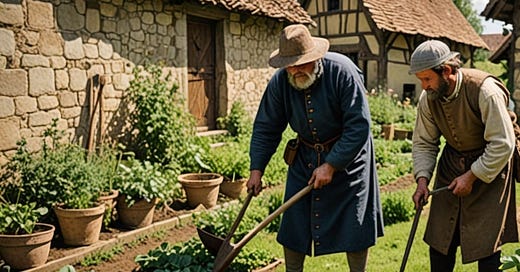Medieval Peasants Did Not Work Less
People living in modern cities and suburbs have no idea just how much work a medieval peasant had to do every day. Most of the work that people had to do was not doing their ‘jobs’, but their-----
People living in modern cities and suburbs have no idea just how much work a medieval peasant had to do every day. Most of the work that people had to do was not doing their ‘jobs’, but their daily chores. Most of the rules on work were to make sure the lord of the land left the peasants enough time to get those chores done, not give them time to relax, as popularly assumed. People today get to outsource almost all of these daily chores by working only a tiny fraction of the time those required at their jobs instead.
Feeding your animals and weeding your personal garden didn’t count as work. But those were your daily chores that a medieval peasant had to do. This isn’t taking care of the village fields or the lord’s lands, just what you had, and everyone had gardens and livestock of their own to take care of just to survive. But those two chores easily took up 10 hours every week that are not added to what most think of as the work. Then there is every single day grinding your flour by hand then making bread. That is another hour every day to make that day’s bread. They were not just popping pasta in a pot or opening a can, either. Every meal takes pealing, scraping, chopping and butchering, and building up the fire. That is a couple more hours every day. Depending on where, gathering firewood so you can cook is an additional five to ten hours a week. These are just your chores, and did not count as work, but the medieval peasants had to do them daily.
But those were far far from them all. Sticking your clothes in a machine isn’t doing laundry. Most days they had to wash in a bucket what they wore yesterday. Washing your clothes right by hand is hard work and takes time every single day. But before you wash it, you checked to see if it needed mending or patching. You were hard on clothes, and they wore out fast, so a couple times a week you were going to need to mend or patch what you had to wash before you started. So that takes up another seven hours a week just doing that. But mending requires thread. That you made in the evening out of flax and other similar plants. Turning flax into thread, twine and rope, and you needed to make all three yourself as part of your chores, wasn’t easy, and would have taken up hours most nights. You need enough of all three that breaking down that flax into fiber and then twisting it to get what you wanted likely took between ten and twenty hours a week. But that is a chore that you could do sitting inside talking to family and not “work”, so it doesn’t count under what is so often counted as how much a peasant works.
Then there is other maintenance, You have tools that you used at home and ‘at work’ that day that you have to sharpen. That is almost every day. Everything you have, you made of the cheapest materials you can get, so ongoing household maintenance is a daily task and there is always something you have to be carving so you can replace an old and worn-out piece. There is not enough hours in the day to cover every single thing you have to do so you do what you can, and with luck taking time off from doing them doesn’t hurt you too bad from time to time, but most days, you are doing chores sun up to sun down when you are not working the lords, fields for him. Too many people equate time away from “work”, with time to do nothing. Free time for the medieval peasant was time to work on what you need done to take care of yourself, not time to do nothing but entertain yourself.
There were times when you could take time off from doing so many, but those were generally seasonal and dependent on the weather, and getting your normal stuff done when you had the chance to. Many failed to get what they needed done, and depended on the village, lord and church to bail them out. Modern people work for others to buy tools so that they only have to spend a tiny fraction of their time on doing chores that the medieval peasant did and what few they still did, take far far less effort. That trade off means you have more leisure time than they ever dreamed of even if you are spending more time working for the boss.






